Israeli President Isaac Herzog is scheduled to visit Ankara on March 9 and meet with Turkish President Recep Tayyip Erdoğan, aiming to launch a process of normalization of ties between Israel and Turkey. This comes after more than a decade of volatile relations, as Erdoğan is trying to transition a Turkish foreign policy marked by confrontation with neighbors to a more cooperative one. Finally, the war in Ukraine is creating an added incentive for both countries to revisit their relationship, which the United States should more actively support.
From strategic partnership to antagonism
Since Turkey became the first Muslim country to recognize Israel in 1949, relations between the two countries have known many ups and downs. It was the Arab-Israeli peace process in the early 1990s and the prospects of solving the Palestinian problem that opened the way for the relationship to become a strategic partnership. The two sides enjoyed close military cooperation, including in counterterrorism and intelligence sharing, as well as strong economic and tourism ties. Once Erdoğan became prime minister in 2003, he continued to support this policy. He even hosted the late Shimon Peres and Mahmoud Abbas together in Turkey in 2007 and also supported indirect talks between Israel and Syria.
However, this positive climate and partnership ended when Israel launched a military operation against Hamas in Gaza in December 2008. At the World Economic Forum in Davos, Erdoğan accused President Peres of “know[ing] well how to kill” and stormed out of the meeting. The relationship hit another low when Israeli Defense Forces in May 2010 raided a Turkish ship, the Mavi Marmara, part of a humanitarian flotilla which Israel considered as attempting to break the naval blockade of Gaza, killing nine Turks on board and wounding scores of passengers. Erdoğan reacted by stating “it is no longer possible to cover up or ignore Israel’s lawlessness” and that Israel’s action “deserves every kind of curse.” Moreover, Erdoğan recalled the Turkish ambassador to Israel and expelled the Israeli ambassador. The political dialogue between Jerusalem and Ankara collapsed, while defense cooperation and mutual high-level visits stopped. Tourism declined dramatically, though trade ties continued to expand, keeping the relationship between the two countries afloat.
At the behest of U.S. President Barack Obama, Israel apologized to Turkey over the Mavi Marmara incident in 2013 and later agreed to pay compensation to the families of the victims, paving the way to a normalization agreement between the two countries in June 2016. This normalization lasted for less than two years, when the killing of more than 60 Palestinians protesting the inauguration of the U.S. embassy in Jerusalem on the Gaza-Israel border in May 2018 led Turkey to again lower its level of diplomatic representation.
Renewed efforts to normalize ties and shared interests
Recent Turkish efforts at normalization is happening in a very different context compared to a decade ago. Erdoğan is facing great economic difficulties at home. His approval ratings are down; public opinion polls indicate opposition parties could muster a majority if elections were held today. Furthermore, as noted by several analysts and retired ambassadors, Turkish foreign policy has left the country isolated in the region, leading Erdoğan to embark on an energetic effort to rebuild relations with the United Arab Emirates, Egypt, and Saudi Arabia. Herzog’s visit needs to be seen as a Turkish effort to move from an ideologically-driven foreign policy to a more pragmatic and realist one.
In this context, Turkey and Israel traditionally viewed geopolitical trends and developments in the Middle East region in a similar way, both attaching great importance to stability in Syria, believing Iran should not have nuclear weapons, and prioritizing the fight against terror. Interestingly, in the current Russia-Ukraine crisis, both Turkey and Israel have chosen a certain form of neutrality. They have rhetorically stood by Ukraine’s territorial integrity and sovereignty while attempting not to disrupt their relations with Moscow. Both Erdoğan and Israeli Prime Minister Naftali Bennett have offered to mediate; Bennett met with Russian President Vladimir Putin in Moscow over the weekend while Erdoğan spoke with Putin on the phone.
On the economic side, leaders in both countries have made sure over the years that political tensions would not disrupt business and investments. Bilateral trade reached a new high of nearly $5.75 billion in 2020, with Turkey listed among Israel’s top 10 trade partners. Though a much smaller economy, Israel is strikingly a bigger importer of Turkish exports than Russia. Israel’s discovery of offshore natural gas was viewed by both sides as a possible game changer, with the potential of Israel to transport gas to Turkey and from there to southern Europe. Plans for such a pipeline have been shelved in recent years, but the pressure that the Russia-Ukraine war is putting on energy markets is likely to revive them especially if bilateral relations continue to improve. With the additional expected loss of tourism from Russia and Ukraine, Turkey is also keen to get back Israeli tourism.
However, the main stumbling block between the two countries will remain the Palestinian issue together with Erdoğan’s attachment to Hamas and the broader Muslim Brotherhood movement. Erdoğan has often been loudly critical of Israel’s Palestinian policies to garner and rally his base. In this regard Turkey has backed Hamas in Gaza (politically and financially) and allowed the organization to establish a representation office in Istanbul, much to the dismay of Israel. The divide over the Palestinian issue was further exacerbated by Erdoğan’s harsh anti-Israeli rhetoric, going as far as accusing Israel of committing genocide, which Israelis believe is anti-Semitic.
Drivers of normalization
Over the past decade it was Erdoğan who dictated the nature of the relationship, with Israel in a more reactive mode. The negative trajectory in relations led Israel to align more closely with other Eastern Mediterranean nations, forming a new regional axis of cooperation with Greece and Cyprus, all concerned with Turkey’s aggressive regional posture.
The creation of a new national unity government in Israel in June 2021, led by Bennett and a coalition including for the first time an Arab Islamist Party — and the ouster of longtime Prime Minister Benjamin Netanyahu — was viewed very positively in Ankara. Isaac Herzog’s election as president in July provided Erdoğan an opportunity to reach out and establish a channel of communication with the Israeli president, whose role is more ceremonial and is considered apolitical, yet who has a special relationship with Bennett who has high regard for and is eager to use Herzog’s diplomatic skills. Several telephone conversations in recent months between Erdoğan and Herzog, and one between Erdoğan and Bennett, signaled a possible rapprochement. The decision to invite Herzog was a carefully thought-out plan by Erdoğan and his advisors and may serve as a first step in normalizing relations.
A major consideration for Erdoğan is Turkey’s prolonged economic crisis, which has led him to reach out to Israel and other regional economic powers such as Saudi Arabia and the UAE in an effort to thaw relations and seek support. Moreover, improving relations with Israel was always considered by Turkey as a way to gain favor with Washington and the present circumstances are no different. The Abraham Accords signed in 2020 between Israel, the UAE, Bahrain, and Morocco also made it clear to Erdoğan that the region is moving in a different direction and that Turkey may be left behind if it does not normalize ties with Israel. The option of resuming bilateral discussions on natural gas cooperation is appealing to Turkey, especially as the U.S. has recently announced it no longer supports the EastMed Pipeline (between Israel, Cyprus, Greece, and Italy). Turkey has also been excluded from the Eastern Mediterranean Gas Forum (EMGF) established in 2020, in which Israel, Greece, Cyprus, and Egypt are closely coordinating energy policies, and would certainly want to be included in the forum in the future.
On the Israeli side there is a realization it is best to neutralize the animosity between Jerusalem and Ankara and a recognition that improved relations with Turkey serve core Israeli strategic and economic interests.
Looking ahead
After more than a decade of acrimony between Israel and Turkey, Herzog’s visit to Turkey is welcome, but it should not be seen as more than a first step forward in a precarious relationship marked by deep mistrust. There appears to be interest on both sides to see it succeed, but much will depend on developments on the Palestinian issue and on the position that Erdoğan will take vis-à-vis Hamas’s continued presence in Turkey. Furthermore, the willingness of leaders on both sides to avoid populist rhetoric to serve domestic political ends and instead maintain a pragmatic approach that focuses on common interests will be critical.
Russia’s invasion of Ukraine and its military presence in Syria dramatically alter the regional security order and will likely to help concentrate minds on both sides in support of normalization. Moving forward, Washington has an interest to support this effort between two key allies and partners, especially in the light of the instability resulting from the war in Ukraine.
The Brookings Institution is committed to quality, independence, and impact.
We are supported by a diverse array of funders. In line with our values and policies, each Brookings publication represents the sole views of its author(s).

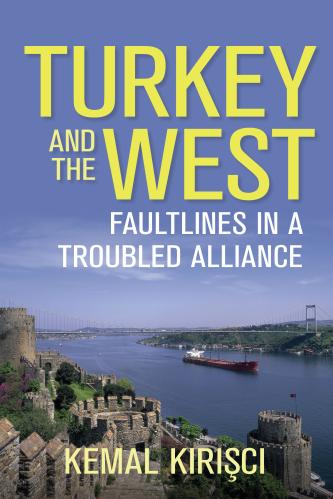
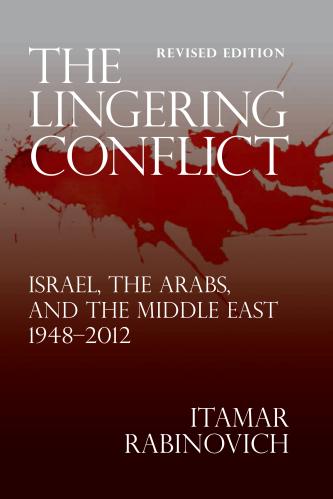

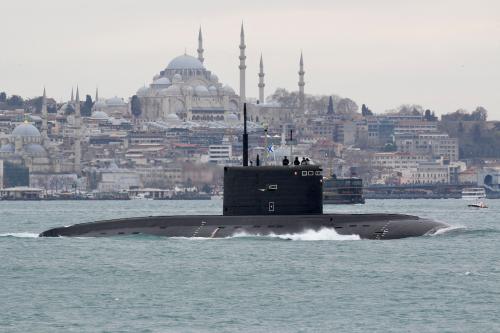
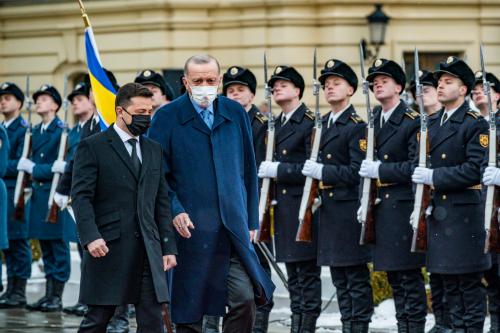
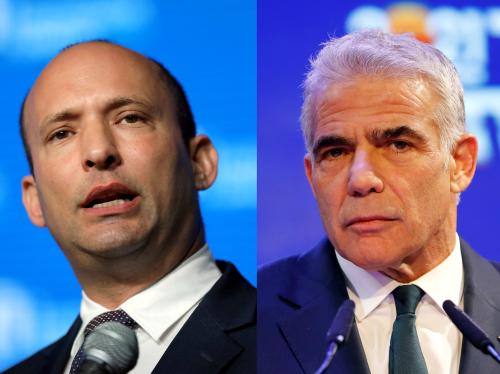





Commentary
President Herzog’s visit to Ankara: A first step in normalizing Turkey-Israel relations?
March 7, 2022